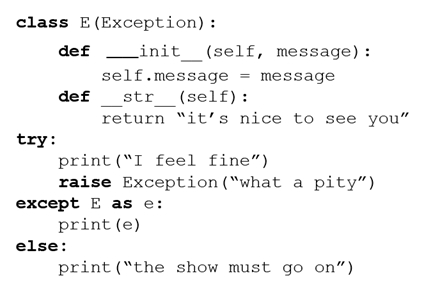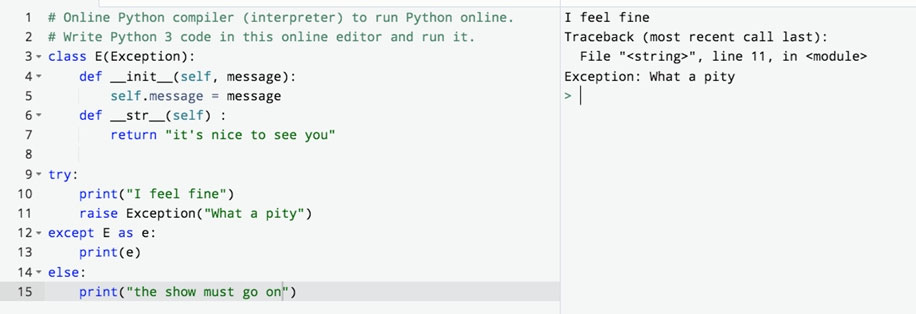What is true about the following snippet? (Choose two.)

What is true about the following snippet? (Choose two.)

BD

B. the string I feel fine will be seen - it happens before any exception is raised C. unhandled exception is raised and writes down "Exception: what a pity", not only "what a pity" as the answer D states
The answer is B,C
It actually is BD. The string "what a pity" is the error message displayed so technically it will be seen along with "I feel fine".
Although answer B, C and D are correct. I think B and D are the 'best' answers. Because C an unhandled exception is raised, D is true. B is true because the line is printed before C and D happen.
B. the string I feel fine will be seen D. the string what a pity will be seen
Answer in BD, I've tested: class E(Exception): def __init__(self, message): self.message = message def __str__(self): return "It's nice to see you" try: print("I fell fine") raise Exception("What a party") except E as e: print(e) else: print("the show must go on") #Output: #I fell fine #Traceback (most recent call last): # File "C:\devops\python\t.py", line 9, in <module> # raise Exception("What a party") #Exception: What a party
the message 'I fell fine' will be seen and the code will raise an unhandled exception and the message 'what a pity ' will be seen. The answers could be B,C or D
The B option is correct because the string I feel fine is printed on screen, and the D option is printed too.
The raise Exception("What a pity") line raises a generic Exception, not an instance of the custom exception E. Since the except E as e block is specifically looking for instances of E, it won't catch the raised exception, and the control will go directly to the else block. However! The program terminates abruptly after encountering the unhandled Exception, and the else block doesn't get a chance to execute. When an unhandled exception occurs, the normal program flow is disrupted, and subsequent code (including the else block) is skipped. To make the else block execute, you would need to handle the exception, either by catching it with the correct except block or allowing the program to handle it at a higher level.
The code could also be like this perhaps class E(Exception): def __init__(self, message): self.message = message def __str__(self): return "It's nice to see you" try: print("I feel fine") raise Exception("what a pity") except Exception as e: print(e) else: print("the show must go on")
B.D. watch video. Answer broken down at 47 minutes. https://www.youtube.com/watch?v=Tme3Op1_IPk